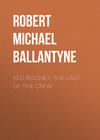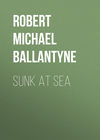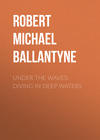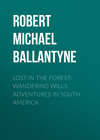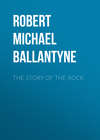Kitabı oku: «Red Rooney: The Last of the Crew», sayfa 4
“The words of Ujarak are wise,” he said. “I was down at the high bluffs yesterday, and saw that what he says is true, for many seals are coming up already, and birds too. Let us go out to the hunt.”
“We would like much to see this wonderful Kablunet,” remarked the jovial big hunter Simek, with a bland look at the company, “but Ujarak knows best. If the Kablunet needs rest, he must have it. If he needs sleep, he must have it. If he wants food, he must have it. By all means let him have it. We will not disturb him. What the torngak of Ujarak advises we will do.”
Several of the other leading men also spoke on this occasion—some inclining to accept the wizard’s advice; others, who were intolerably anxious to see the Kablunet, rather inclining to the opinion that they should remain where they were till he recovered strength enough to be able to pay his contemplated visit.
Ippegoo spoke last. Indeed, it was not usual for him to raise his voice in council, but as he had been the first to carry the important news, and was known to be an ardent admirer and pupil of Ujarak, he felt that he was bound to back his patron; and his arguments, though not cogent, prevailed.
“Let us not doubt the wisdom of the angekok,” he said. “His torngak speaks. It is our business to obey. We have starved much for some moons; let us now feast, and grow fat and strong.”
“Huk!” exclaimed the auditors, who had been touched on their weakest point.
“But Angut has not yet uttered his mind,” said the jovial Simek, turning with a bland expression to the man in question; “he is an angekok, though he will not admit it. Has not his familiar spirit said anything to him?”
Angut looked gravely at the speaker for a moment or two, and shook his head. Dead silence prevailed. Then in a voice that was unusually soft and deep he said: “I am no angekok. No torngak ever speaks to me. The winds that whistle round the icebergs and rush among the hummocks on the frozen sea speak to me sometimes; the crashing ice-cliffs that thunder down the glens speak to me; the noisy rivulets, the rising sun and moon and winking stars all speak to me, though it is difficult to understand what they say; but no familiar spirit ever speaks to me.”
The man said this quietly, and in a tone of regret, but without the slightest intention of expressing poetical ideas, or laying claim to originality of thought. Yet his distinct denial of being an angekok or wise man, and his sentiments regarding the voices of Nature, only confirmed his countrymen in their belief that he was the greatest angekok they had ever seen or heard of.
“But surely,” urged Simek, “if so many spirits speak to you, they must tell you something?”
“They tell me much,” replied Angut in a contemplative tone, “but nothing about hunting.”
“Have you no opinion, then, on that subject?”
“Yes, I have an opinion, and it is strong. Let all the hunters go south after seals without delay; but I will not go. I shall go among the icebergs—alone.”
“He will go to hold converse with his numerous torngaks,” whispered old Kannoa to Pussimek.
“He will go to visit Okiok, and see the Kablunet, and court Nunaga,” thought the jealous and suspicious Ujarak.
And Ujarak was right; yet he dared not follow, for he feared the grave, thoughtful man, in spite of his determination to regard and treat him with lofty disdain.
Utterly ignorant of the wizard’s feelings towards him—for he was slow to observe or believe in ill-will towards himself when he felt none to any one else—Angut set off alone next morning in the direction that led to the great glacier, while his countrymen harnessed their dogs, loaded their sledges with lines and weapons, and went away southward on a hunting expedition. Wishing the latter all success, we will follow the fortunes of Angut, the eccentric angekok.
Had you and I, reader, been obliged to follow him in the body, we should soon have been left far behind; fortunately, spirit is more powerful and fleet than matter!
Without rest or halt, the stalwart Eskimo journeyed over the ice until he reached the residence of Okiok.
The dogs knew his step well, and gave no noisy sign of his approach, though they rose to welcome him with wagging tails, and rubbed their noses against his fur coat as he patted their heads.
Creeping into the hut, he presented himself unexpectedly. Okiok bade him silent welcome, with a broad grin of satisfaction. Nunaga did the same, with a pleased smile and a decided blush. The other inmates of the hut showed similar friendship, and Tumbler, trying to look up, fell over into an oil-puddle, with a loud crow of joy. They all then gazed suddenly and simultaneously, with mysterious meaning, at Red Rooney, who lay coiled up, and apparently sound asleep, in the innermost corner.
Angut also gazed with intense interest, though nothing of the sleeping man was visible save the point of his nose and a mass of curling brown hair protruding from his deerskin coverings.
Seating himself quietly between Nunaga and Nuna, and taking the oily Tumbler on his knee, the visitor entered into a low-toned conversation respecting this great event of their lives—the arrival of a real live Kablunet! They also talked of Kablunets in general, and their reported ways and manners. It is to be noted here that they did not talk in whispers. Okiok and Nuna had indeed begun the conversation thus, but had been immediately checked by Angut, whose intelligence had long ago taught him that no sound is so apt to awaken a sleeper as the hiss of a whisper; and that a steady, low-toned hum of conversation is more fitted to deepen than interrupt slumber.
“Is he very thin?” asked Angut, who had been somewhat impressed by Ujarak’s description of the stranger, and his evident desire that no one should go near him.
“He is not fat,” answered Okiok, “but he has not been starving long; sleeping and stuffing will soon make him strong. Don’t you think so, Norrak? You saw him at his worst, when we found him on the ice.”
Thus appealed to, Okiok’s eldest son laid down the piece of blubber with which he had been engaged, nodded his head several times, and said, “Yes, he will be able to run, and jump soon.”
“And he speaks our language well,” said Okiok, with a look of great interest.
“I know it,” returned his friend; “Ujarak told us about that. It is because of that, that I have come at once to see him.” Nunaga winced here, for she had timidly hoped that Angut had come to see her! “I would not,” continued the visitor, “that Ujarak should be the first to speak to him, for he will poison his ears.”
“Yes, Ujarak is a dreadful liar,” said Okiok solemnly, but without the slightest touch of ill feeling.
“An awful liar,” remarked Nuna softly.
Nunaga smiled, as though acquiescing in the sentiment, but said nothing.
Just as they gave utterance to this decided opinion as to the character of the wizard, Red Rooney turned round, stretched himself, yawned, and sat up.
Chapter Six.
Angut and Rooney hold Converse on many Things
At first Rooney did not observe that there was a visitor in the hut, but, when his eyes alighted on him, he rose at once, for he felt that he was in the presence of a man possessed of intelligence vastly superior to that of the ordinary natives. It was not so much that Angut’s presence was commanding or noble, as that his grave expression, broad forehead, and earnest gaze suggested the idea of a man of profound thought.
The angekok who had been so graphically described to him by Okiok at once recurred to Rooney’s mind. Turning to his host, he said, with a bland expression—
“I suppose this is your friend Angut, the angekok?”
“Yes,” replied Okiok.
While the mysterious foreigner was speaking, Angut gazed at him with looks and feelings of awe, but when he stepped forward, and frankly held out his hand, the Eskimo looked puzzled. A whispered word from his host, however, sufficed to explain. Falling in at once with the idea, he grasped the offered hand, and gave it a squeeze of good-will that almost caused the seaman to wince.
“I am glad to meet you,” said Rooney.
“I am more than glad,” exclaimed the Eskimo with enthusiasm; “I have not language to tell of what is in my mind. I have heard of Kablunets, dreamed of them, thought of them. Now my longings are gratified—I behold one! I have been told that Kablunets know nearly everything; I know next to nothing. We will talk much. It seems to me as if I had been born only to-day. Come; let us begin!”
“My friend, you expect too much,” replied Rooney, with a laugh, as he sat down to devote himself to the bear-steak which Nunaga had placed before him. “I am but an average sort of sailor, and can’t boast of very much education, though I have a smattering; but we have men in my country who do seem to know ’most everything—wise men they are. We call them philosophers; you call ’em angekoks. Here, won’t you go in for a steak or a rib? If you were as hungry as I am, you’d be only too glad and thankful to have the chance.”
Angut accepted a rib, evidently under the impression that the Kablunet would think it impolite were he to refuse. He began to eat, however, in a languid manner, being far too deeply engaged with mental food just then to care for grosser forms of nourishment.
“Tell me,” said the Eskimo, who was impatient to begin his catechising, “do your countrymen all dress like this?” He touched the sealskin coat worn by the sailor.
“O no,” said Rooney, laughing; “I only dress this way because I am in Eskimo land, and it is well suited to the country; but the men in my land—Ireland we call it—dress in all sorts of fine cloth, made from the hair of small animals— Why, what do you stare at, Angut? Oh, I see—my knife! I forgot that you are not used to such things, though you have knives—stone ones, at least. This one, you see, is made of steel, or iron—the stuff, you know, that the southern Eskimos bring sometimes to barter with you northern men for the horns of the narwhal an’ other things.”
“Yes, I have seen iron, but never had any,” said Angut, with a little sigh; “they bring very little of it here. The Innuits of the South catch nearly the whole of it on its journey north, and they keep it.”
“Greedy fellows!” said Rooney. “Well, this knife is called a clasp-knife, because it shuts and opens, as you see, and it has three blades—a big one for cuttin’ up your victuals with, as you see me doin’; and two little ones for parin’ your nails and pickin’ your teeth, an’ mendin’ pens an’ pencils—though of course you don’t know what that means. Then here, you see, there are two little things stuck into the handle. One is called tweezers, an’ is of no earthly use that I know of except to pull the hairs out o’ your nose, which no man in his senses ever wants to do; and the other thing is, I suppose, for borin’ small holes in things—it’s almost as useless. This thing on the back is for pickin’ stones out of horses’ hoofs—but I forgot you never saw horses or hoofs! Well, no matter; it’s for pickin’ things out of things, when—when you want to pick ’em out! But below this is an uncommon useful thing—a screw—a thing for drawin’ corks out of bottles—there, again, I’m forgettin’. You never saw corks or bottles. Happy people—as the people who don’t drink spirits would call you—and, to say truth, I think they are right. Indeed, I’ve been one of them myself ever since I came to this region. Give us another steak, Nunaga, my dear—no, not a bear one; I like the walrus better. It’s like yourself—tender.”
The fair Nunaga fell into a tremendous giggle at this joke, for although our hero’s Eskimo was not very perfect, he possessed all an Irishman’s capacity for making his meaning understood, more or less; and truly it was a sight to behold the varied expressions of face—the childlike surprise, admiration, curiosity, and something approaching to awe—with which those unsophisticated natives received the explanation of the different parts of that clasp-knife!
“But what did we begin our talk about?” he continued, as he tackled the walrus. “O yes; it was about our garments. Well, besides using different kinds of cloths, our coats are of many different shapes: we have short coats called jackets, and long coats, and coats with tails behind—”
“Do your men wear tails behind?” asked Angut, in surprise.
“Yes; two tails,” replied Rooney, “and two buttons above them.”
“Strange,” remarked Angut; “it is only our women who have tails; and they have only one tail each, with one button in front—not behind—to fasten the end of the tail to when on a journey.”
“Women with tails look very well,” remarked Okiok, “especially when they swing them about in a neat way that I know well but cannot describe. But men with tails must look very funny.”
Here Mrs Okiok ventured to ask how the Kablunet women dressed.
“Well, it’s not easy to describe that to folk who have never seen them,” said the sailor, with a slight grin. “In the first place, they don’t wear boots the whole length of their legs like you, Nuna.”
“Surely, then,” remarked the hostess, “their legs must be cold?”
“By no means, for they cover ’em well up with loose flapping garments, extending from the waist all the way down to the feet. Then they don’t wear hoods like you, but stick queer things on their heads, of all shapes and sizes—sometimes of no shape at all and very small size—which they cover over with feathers, an’ flowers, an’ fluttering things of all colours, besides lots of other gimcracks.”
How Rooney rendered “gimcracks” into Eskimo we are not prepared to say, but the whole description sent Nunaga and her mother into fits of giggling, for those simple-minded creatures of the icy north—unlike sedate Europeans—are easily made to laugh.
At this point Angut struck in again, for he felt that the conversation was becoming frivolous.
“Tell me, Kablunet,” he began; but Rooney interrupted him.
“Don’t call me Kablunet. Call me Red Rooney. It will be more friendly-like, and will remind me of my poor shipmates.”
“Then tell me, Ridroonee,” said Angut, “is it true what I have heard, that your countrymen can make marks on flat white stuff, like the thin skin of the duck, which will tell men far away what they are thinking about?”
“Ay, that’s true enough,” replied the sailor, with an easy smile of patronage; “we call it writing.”
A look of grave perplexity rested on the visage of the Eskimo.
“It’s quite easy when you understand it, and know how to do it,” continued Rooney; “nothing easier.”
A humorous look chased away the Eskimo’s perplexity as he replied—
“Everything is easy when you understand it.”
“Ha! you have me there, Angut,” laughed the sailor; “you’re a ’cute fellow, as the Yankees say. But come, I’ll try to show you how easy it is. See here.” He pulled a small note-book from his pocket, and drew thereon the picture of a walrus. “Now, you understand that, don’t you?”
“Yes; we draw like that, and understand each other.”
“Well, then, we put down for that w-a-l-r-u-s; and there you have it—walrus; nothing simpler!”
The perplexed look returned, and Angut said—
“That is not very easy to understand. Yet I see something—always the same marks for the same beast; other marks for other beasts?”
“Just so. You’ve hit it!” exclaimed Rooney, quite pleased with the intelligence of his pupil.
“But how if it is not a beast?” asked the Eskimo. “How if you cannot see him at all, yet want to tell of him in—in—what did you say—writing? I want to send marks to my mother to say that I have talked with my torngak. How do you mark torngak? I never saw him. No man ever saw a torngak. And how do you make marks for cold, for wind, for all our thoughts, and for the light?”
It was now Red Rooney’s turn to look perplexed. He knew that writing was easy enough to him who understands it, and he felt that there must be some method of explaining the matter, but how to go about the explanation to one so utterly ignorant did not at once occur to him. We have seen, however, that Rooney was a resolute man, not to be easily baffled. After a few moments’ thought he said—
“Look here now, Angut. Your people can count?”
“Yes; they can go up to twenty. I can go a little further, but most of the Innuits get confused in mind beyond twenty, because they have only ten fingers and ten toes to look at.”
“Well now,” continued Rooney, holding up his left hand, with the fingers extended, “that’s five.”
Yes, Angut understood that well.
“Well, then,” resumed Rooney, jotting down the figure 5, “there you have it—five. Any boy at school could tell you what that is.”
The Eskimo pondered deeply and stared. The other Eskimos did the same.
“But what,” asked Okiok, “if a boy should say that it was six, and not five?”
“Why, then we’d whack him, and he’d never say that again.”
There was an explosion of laughter at this, for Eskimos are tender and indulgent to their children, and seldom or never whack them.
It would be tedious to go further into this subject, or to describe the ingenious methods by which the seaman sought to break up the fallow ground of Angut’s eminently receptive mind. Suffice it to say that Rooney made the discovery that the possession of knowledge is one thing, and the power to communicate it another and a very different thing. Angut also came to the conclusion that, ignorant as he had thought himself to be, his first talk with the Kablunet had proved him to be immeasurably more ignorant than he had supposed.
The sailor marked the depression which was caused by this piece of knowledge, and set himself good-naturedly to counteract the evil by displaying his watch, at sight of which there was a wild exclamation of surprise and delight from all except Angut, who, however deep his feelings might be, always kept them bridled. The expansion of his nostrils and glitter of his eyes, however, told their tale, though no exclamation passed his lips.
Once or twice, when Rooney attempted to explain the use of the instrument, the inquisitive man was almost irresistibly led to put some leading questions as to the nature of Time; but whenever he observed this tendency, the sailor, thinking that he had given him quite enough of philosophy for one evening, adroitly turned him off the scent by drawing particular attention to some other portion of the timepiece.
The watch and the knife, to which they reverted later on, kept the lecturer and audience going till late in the evening, by which time our sailor had completely won the hearts of the Eskimos, and they had all become again so hungry that Okiok gave a hint to his wife to stir up the lamp and prepare supper. Then, with a sigh of relief, they all allowed their strained minds to relax, and the conversation took a more general turn. It is but fair to add that, as the sailor had won the hearts of the natives, so his heart had been effectually enthralled by them. For Angut, in particular, Rooney felt that powerful attraction which is the result of similar tastes, mutual sympathies, and diversity of character. Rooney had a strong tendency to explain and teach; Angut a stronger tendency to listen and learn. The former was impulsive and hasty; the latter meditative and patient. Rooney was humorously disposed and jovial, while his Eskimo friend, though by no means devoid of humour, was naturally grave and sedate. Thus their dispositions formed a pleasing contrast, and their tastes an agreeable harmony.
“What did you say was the name of your country?” asked Angut, during a brief pause in the consumption of the meal.
“England,” said Rooney.
“That was not the name you told me before.”
“True; I suppose I said Ireland before, but the fact is, I can scarcely claim it as my own, for you see my father was Irish and my mother was Scotch. I was born in Wales, an’ I’ve lived a good bit o’ my life in England. So you see I can’t claim to be anything in particular.”
As this was utterly incomprehensible to the Eskimo, he resumed his bit of blubber without saying a word. After a brief silence, he looked at the Kablunet again, and said—
“Have they houses in your land?”
“Houses? O yes; plenty of ’em—made of stone.”
“Like the summer-houses of the Innuit, I suppose?” said Angut. “Are they as big?”
Rooney laughed at this, and said, Yes; they were much bigger—as big as the cliffs alongside.
“Huk!” exclaimed the Eskimos in various tones. Okiok’s tone, indeed, was one of doubt; but Angut did not doubt his new friend for a moment, though his credulity was severely tested when the seaman told him that one of the villages of his countrymen covered a space as big as they could see—away to the very horizon, and beyond it.
“But, Angut,” said Rooney, growing somewhat weary at last, “you’ve asked me many questions; will you answer a few now?”
“I will answer.”
“I have heard it said,” began the sailor, “that Angut is a wise man—an angekok—among his people, but that he denies the fact. Why does he deny it?”
The Eskimo exchanged solemn glances with his host, then looked round the circle, and said that some things could not be explained easily. He would think first, and afterwards he would talk.
“That is well said,” returned Rooney. “‘Think well before you speak’ is a saying among my own people.”
He remained silent for a few moments after that, and observed that Okiok made a signal to his two boys. They rose immediately, and left the hut.
“Now,” said Okiok, “Angut may speak. There are none but safe tongues here. My boys are good, but their tongues wag too freely.”
“Yes, they wag too freely,” echoed Mrs Okiok, with a nod.
Thus freed from the danger of being misreported, Angut turned to the seaman, and said—
“I deny that I am an angekok, because angekoks are deceivers. They deceive foolish men and women. Some of them are wicked, and only people-deceivers. They do not believe what they teach. Some of them are self-deceivers. They are good enough men, and believe what they teach, though it is false. These men puzzle me. I cannot understand them.”
The Eskimo became meditative at this point, as if his mind were running on the abstract idea of self-delusion. Indeed he said as much. Rooney admitted that it was somewhat puzzling.
“I suppose,” resumed the Eskimo, “that Kablunets never deceive themselves or others; they are too wise. Is it so?”
“Well, now you put the question,” said Rooney, “I rather fear that some of us do, occasionally; an’ there’s not a few who have a decided tendency to deceive others. And so that is the reason you won’t be an angekok, is it? Well, it does you credit. But what sort o’ things do they believe, in these northern regions, that you can’t go in with? Much the same, I fancy, that the southern Eskimos believe?”
“I know not what the southern Eskimos believe, for I have met them seldom. But our angekoks believe in torngaks, familiar spirits, which they say meet and talk with them. There is no torngak. It is a lie.”
“But you believe in one great and good Spirit, don’t you?” asked the seaman, with a serious look.
“Yes; I believe in One,” returned the Eskimo in a low voice, “One who made me, and all things, and who must be good.”
“There are people in my land who deny that there is One, because they never saw, or felt, or heard Him—so they say they cannot know,” said Rooney. Angut looked surprised.
“They must be fools,” he said. “I see a sledge, and I know that some man made it—for who ever heard of a sledge making itself? I see a world, and I know that the Great Spirit made it, because a world cannot make itself. The greatest Spirit must be One, because two greatests are impossible, and He is good—because good is better than evil, and the Greatest includes the Best.”
The seaman stared, as well he might, while the Eskimo spoke these words, gazing dreamily at the lamp-flame, as if he were communing with his own spirit rather than with his companion. Evidently Okiok had a glimmering of what he meant, for he looked pleased as well as solemn.
It might be tedious to continue the conversation. Leaving them therefore to their profound discussions, we will turn to another and very different social group.
